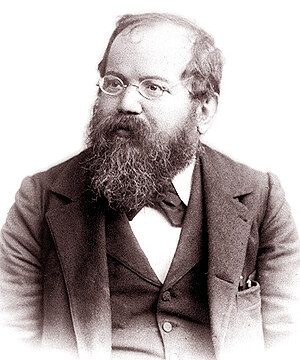The Jews | Column 2: Wilhelm Steinitz – The Father of Modern Chess
How Wilhelm Steinitz, a Jewish pioneer from Prague, changed the history of chess forever, and became the first official World Chess Champion.

Today, 189 years ago, in a quiet corner of 19th-century Prague, in the heart of a bustling Jewish quarter, a small child was born in 1836 to a poor, observant family. In time, he would be remembered as Wilhelm Steinitz, the father of modern chess, the man who turned a game of feeling into an art of principles. Steinitz wasn’t just a chess player, he was a revolutionary. In an era when chess champions played by "gut feeling" and without a coherent theory, he arrived with a message: strategy. Defense. Structural principles. In other words: scientific chess.
The Jewish child who fought for every step
Steinitz was born with a physical disability one leg shorter than the other and in his childhood, he was often mocked. He found comfort in the chessboard, which he began learning to play at the age of 12. When he left Prague to study mathematics in Vienna, he discovered the local chess scene and flourished. Before long, he became a known name, not thanks to his looks but thanks to his sharp mind. By the 1860s, he was already considered one of the best in the world. But what earned him his place in history was not just brilliant tactical ability but the understanding that the game needed a method.
The revolution: principles instead of intuition
Steinitz dared to say what no one before him had: attack is not a goal it is a means. He argued that there is "logic" in chess positions, that one can build an advantage over time, defend patiently, and not rush to strike. Many mocked him until he started defeating them all, one by one, using his system. He formulated rules that are now considered the foundation stones of chess:
For a world that believed in intuition over methodology, it was an earthquake. Steinitz became a quiet revolutionary, a revolutionary with a chessboard.
The first world champion
In 1886 he defeated Johannes Zukertort in a match officially recognized as the first world championship in history. Thus, Steinitz a small Jew from Eastern Europe became the first world chess champion. But Steinitz did not express himself only over the board, but also beyond it. He edited a magazine, wrote books, and voiced controversial opinions. He was not a crowd favorite but he was determined. Many saw him as a difficult man, even hot-tempered. It’s likely that Steinitz belonged somewhere on the “genius-madness” spectrum.
The genius’s end
His final years were hard. After losing the championship title to the young master Emanuel Lasker (also a Jew, about whom we may write later), his mental health declined. He became poor, lonely, and died in a Manhattan hospital from a heart attack in 1900. Yet even if his life ended in shadow, his legacy remains in light. Every chess champion, every student beginning to learn the game, starts with Steinitz. He didn’t just change how we play, but how we think.
Between Prague and New York, between rook and bishop
Steinitz was not just a Jew, and not just a champion, but a symbol of the Jewish ability to see the world differently: not through anchorless intuition, but through deep understanding, a search for logic, a pursuit of truth even when it is unpopular. In many ways, he was a revolutionary dressed as a player. And thanks to him, chess ceased to be a game, and became a science.
Missed the first column in our series?
Discover the story of Jack Steinberger, the Jewish physicist who cracked the invisible and reshaped our understanding of the universe.